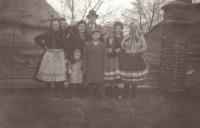“Am I supposed to ask for permission to come back home?”

Stáhnout obrázek
Růžena Babičová, née Pevnerová, was born in 1922 in Frélichov, a Croatian village in southern Moravia. Her mother tongue is Croatian. She also speaks Czech because she attended Czech schools and because of the proximity of Austria, she also speaks German. After the annexation of the Sudetenland, her two brothers had to enrol in the German army; one of them fell in the war. After the war, she married František Babič, a Croat. In 1949, the family was displaced and moved to the town of Húzová in northern Moravia. However, as she was passionately missing her native village, she kept coming back in the fifties even though she was missing the necessary permits. They moved to Břeclav in the sixties. They kept speaking Croatian in the family and therefore their kids speak the language and Mrs. Babičová still speaks Croatian today at a very high level.
